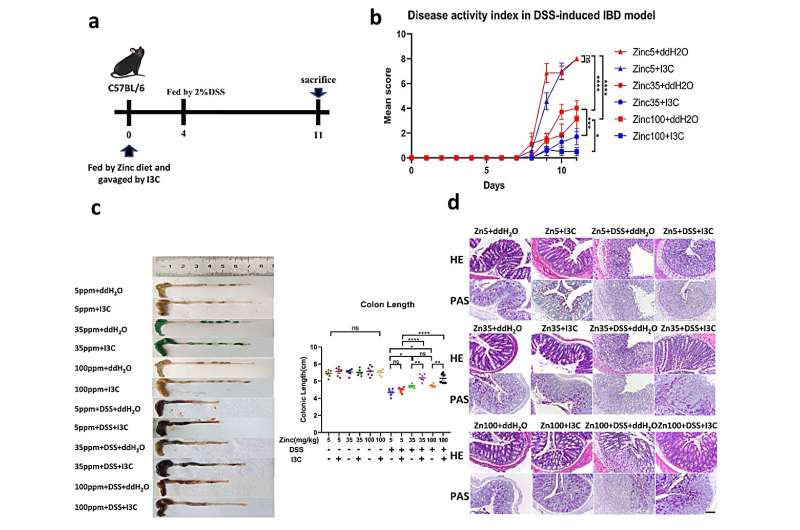This article has been reviewed according to Science X's editorial process and policies. Editors have highlighted the following attributes while ensuring the content's credibility:
fact-checked
peer-reviewed publication
trusted source
proofread
Researchers show zinc plays a key role in inflammatory bowel disease and 'leaky gut'

New research, published in Nature Communications, has found that a link between the important micronutrient zinc and a sensor protein in the gut in the prevention and management of a range of bowel conditions, such as inflammatory bowel disease (IBD).
Professor Christer Hogstrand led an international team that created "mini-guts" from human stem cells and mice. They investigated the role of zinc and a sensor named the Aryl Hydrocarbon Receptor (AHR) that helps the body react to nutrients, drugs and toxic substances in the bowel.
Mice fed a diet containing zinc and a chemical from cruciferous vegetables—such as broccoli—that stimulates the AHR were almost completely alleviated of IBD. In contrast, mice fed a zinc-deficient diet received no benefit from AHR activation.
The research has implications for about a third of the world's population that are zinc deficient, with a prevalence that is highest in countries where diets are dominated by plant-based foods, which are poor sources of nutritionally available zinc. The discovery offers new options to manage IBD through dietary supplementation with zinc and plant-derived bioactive compounds that stimulate AHR, which are particularly abundant in cruciferous vegetables.
"Meat and seafood are the best dietary sources of zinc, however global poverty, sustainability issues, and animal welfare concerns are moving the planet's population away from animal-based diets and towards plant-based foods. Therefore, to avoid insufficient intake of this critically important micronutrient it is necessary to ensure that there is an adequate zinc supply," says Hogstrand, professor of molecular ecotoxicology.
One of the functions of the gut is to serve as a barrier for bacteria, fungi, and viruses and other potentially harmful agents. The inside layer of the bowel contains a thin coating of cells, which are sealed by "tight junctions." Sometimes, these tight junctions can become looser, and the bowel becomes more porous, triggering "leaky gut" or IBD.
To prevent this happening, specific substances in our diet bind to AHR, which then communicates with the cell "tight junctions" and the immune system to keep the bowel healthy and to protect it against inflammation and IBD. The new research shows that AHR does this by letting the essential mineral zinc into the cells, which then improves the seal of the "tight junctions."
There are two types of IBD: Crohn's disease and ulcerative colitis. They occur when the lining of the digestive tract is irritated and swells, causing issues such as stomach pain, diarrhea and bleeding. Leaky gut happens when the digestive tract gets damaged and the gut no longer provides protection against noxious substances. It is a major factor for inflammation, damage to other organs and thus numerous diseases.
Following the results, researchers plan to test the effectiveness of this treatment in human studies.
More information: Xiuchuan Hu et al, Aryl hydrocarbon receptor utilises cellular zinc signals to maintain the gut epithelial barrier, Nature Communications (2023). DOI: 10.1038/s41467-023-41168-y


















